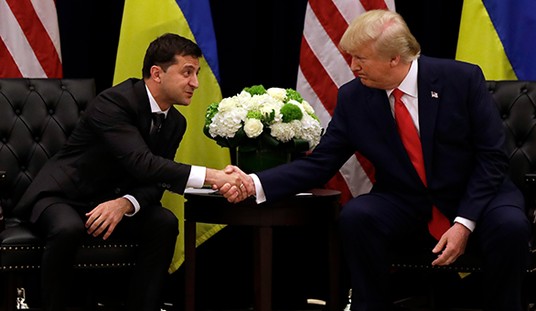A common observation is that new converts to a religion are the most zealous in promoting it. Those who understand that premise can easily see that Vice President Kamala Harris is thoroughly insincere in her recent public conversion to support of fracking.
Public opinion polls show swing state Pennsylvania is very much in play in this year’s presidential election, while fracking is very important there. Pennsylvania currently has around 100,000 direct and indirect jobs related to natural gas production, Forbes notes.
Natural gas is cheaper and cleaner than coal and oil, providing lower-cost, more environmentally friendly electricity across the United States. That brings great benefits to other cold-weather swing states such as Michigan and Wisconsin.
Given those realities, Harris has taken to the stump to say she has opposed a ban on fracking since 2020. Harris uses that wording because she notoriously said in a 2019 town hall, “There’s no question I’m in favor of banning fracking” and that she would implement a nationwide prohibition on her first day in office if elected.
When CNN anchor Dana Bash noted in an interview this past August that Harris seemed to have changed her position during the 2020 election, Harris insisted, “I have not changed that position, nor will I going forward. I kept my word, and I will keep my word.” Harris told Bash she believes the federal government can create a “clean energy economy … without banning fracking.”
Recommended
Harris’ asserted desire to have the federal government “create” a new economy by force is a major “tell” that she is not at all serious about promoting energy freedom and abundance.
Harris appears to be using tricky language to deceive potential voters. It is unlikely that a president could “ban” fracking, especially given recent U.S. Supreme Court rulings reining in the rulemaking powers of executive branch agencies.
For Harris to say she would not ban fracking as president is not much more meaningful than for her to say she would not ban gravity.
The real threat is that a president will use the still-powerful rulemaking authority of the Environmental Protection Agency and other White House powers to put so many restrictions on fracking that it will be unprofitable for companies to engage in it. In 2020, Joe Biden “called for banning new permits for oil and gas projects on federal lands and waters” during the presidential campaign in which Harris was his running mate.
Even so, on October 7, 2020, Harris tweeted, “@JoeBiden will not ban fracking. That is a fact.” That was a straw man argument and still is. Banning oil and gas projects is even more extensive than banning fracking, and halting new projects is a long-term means of ending all production as older wells get tapped out over time.
Sure enough, Biden and Harris tried to eliminate U.S. oil and gas drilling through unconstitutional and economically devastating “social cost of carbon” rules on their first day in office. Biden then signed an executive order banning new oil and natural gas leases on public lands or in offshore waters, in his second week in office.
The Biden-Harris opposition to fracking and other means of gas and oil extraction has continued to this very day, regardless of Harris’ artfully ambiguous rhetoric. In January, the administration imposed a moratorium on approvals of new terminals for export of U.S. liquified natural gas (LNG). Governors of 16 Republican-led states sued, and in July a federal judge blocked the Biden-Harris anti-energy initiative, calling it “completely without reason or logic.”
Harris’ opponent in the presidential race, former President Donald Trump, said he would approve LNG terminals “on my very first day back” in the White House.
In addition to all those impediments to fracking and other oil and gas extraction, Harris supports increasing the royalties that oil and gas companies pay to drill or mine on public lands, which would further reduce production by making it more costly.
Harris could remove all doubt about her position by publicly and explicitly acknowledging that fracking is a tremendous technology and a great American economic opportunity that she and her administration will enthusiastically support, full stop. Harris’ refusal to do that suggests she does not want to be held to her word on it if elected president. That explains why she talks only about a mythical presidential fracking ban instead of positively endorsing the technology.
Trump has unambiguously supported fracking and U.S. energy production, both as a candidate and as president.
“We have more liquid gold under our feet than any other country by far,” Trump said at the Republican National Convention in July. “We are a nation that has the opportunity to make an absolute fortune with its energy.”
True to his word, Trump took the United States out of the Paris climate agreement and opened up oil and gas drilling during his term in office.
Harris, by contrast, still says she is fully committed to a government-forced fundamental transformation of the U.S. economy and energy system. Her carefully altered rhetoric on fracking cannot disguise her hostility to fossil fuel energy production. “Well, let’s be clear. My values have not changed,” Harris told Bash in the CNN interview.
Oh, that is quite clear enough, Madam Vice President.
When judging politicians and candidates, the key is to watch what they do, not what they say. Harris’ actions show she opposes fracking and will do all she can to impede this critical technology and other means of U.S. energy production should she get a chance to occupy the Oval Office.
S. T. Karnick (https://stkarnick.substack.com/) is a senior fellow at The Heartland Institute and author of the Life, Liberty, Property weekly e-newsletter.


